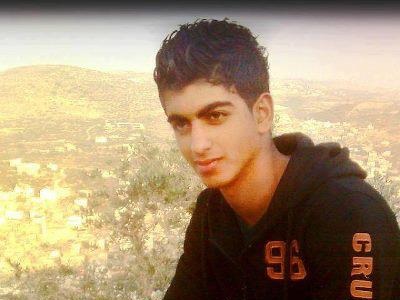
By Felicity Arbuthnot
Last night and overnight, two unarmed teenagers, cousins Amer Nassar (17) and Naji Abdul-Karim Balbeisi (18) were shot dead by Israeli Defence Force troops.
The two were from the village of Anabta, near the town of Tulkarm, in Palestine’s West Bank. Tulkarm was founded in the 13th century, its name derived from the Aramaic “Toor Karma” meaning “mount of vineyards.”
Amer died from a bullet in his chest at 22.30 on Wednesday night, according to eye witnesses. Hearing shots, three boys from the village went out and found Amer lying on the ground, with soldiers standing over him. When they tried to reach him, the soldiers opened fire, injuring one, Fadi Abu-A’sr, in the arm, and subsequently hospitalized.
The three say that ambulance crews were prevented from reaching Amer for thirty vital minutes, with threats to shoot anyone attempting to intervene. Deiyaa’ Nasser, who did attempt to reach Amer:“was arrested by the Israeli Army and taken to an unknown location.”
Naji Abdul-Karim Balbisi, was found as dawn broke this morning, lying in a field. He was reported to have been shot from behind.
Tensions have been high in Gaza and the West Bank since the death of Maysara Abu Hamidya in Israel’s Soroko prison on 2nd April. Sixty five year old Abu Hamidya was a former high ranking officer in the Palestinian Authority (PA) prior to his arrest, which took place when the IDA invaded the West Bank, destroying PA Headquarter buildings, in May 2002.
Palestinian authorities have claimed that the prison was withholding treatment for his cancer. On Monday released prisoner Ayman Sharawna alleged that Hamdiya was in a life threatening condition in the prison infirmary – with his hands and feet shackled.
The Director of the Palestinian Prisoner Society has held the Israeli regime fully responsible for his death.
So, as Palestinians mark another onslaught, the massacre in the Jenin refugee camp (April 1st-11th 2002) the mourning, heartbreak, lost lives and lost youth grind on. But so does the spirit, in young and old.
Seventeen year old Amer Nassar left a poem. When others of his age write on Facebook of their dreams, aspirations, exams, plans, dates, travels, on 15th March, his last entry, he wrote (translated):
“Point your bullet where ever you like in my body
I will die today, but my homeland will live tomorrow
Be careful, Palestine is a red line.”
He did not die on March 15th, but just two weeks and three days later, at the hands of “the most moral army” and the “only democracy in the Middle East.”
(The writer is indebted to the resident of Palestine who drew attention to and translated Amer’s poem and to the International Solidarity Movement, for their careful details of another tragedy.)
– Felicity Arbuthnot is a freelance journalist specializing in social and environmental issues with a special knowledge of Iraq. She contributed this article to PalestineChronicle.com.






Thanks Felicity, very moving tribute to this terrible ongoing siege of Palestine..one day it will end and these martyrs will never be forgotten
Yes thank you…..the courage and idealism of the Palestinian youth will prevail one day
R I P AMER NASSAR
Arab kids play in the rubble of their homeland,
auras of love surround them .
They see parents, schools, life around them
destroyed by enemy soldiers.
In death are no distinctions`:
boys and girls, the old, the young, all become silent.
Love is tramppled by Israelis
yet a dead boy warns them:
“Point your gun anywhere on my body.
I will die today
but my homeland will live tomorrow.
Be careful. Palestine is a red line!”
His contempt of murderers, and his great wisdom
make me careful and sorrowing:
when children are victims all red lines are crossed
and the enemy will die
and nothing will save us.
“Be careful! Palestine is a red line.”